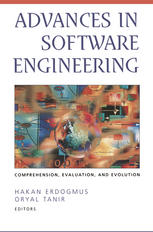

Most ebook files are in PDF format, so you can easily read them using various software such as Foxit Reader or directly on the Google Chrome browser.
Some ebook files are released by publishers in other formats such as .awz, .mobi, .epub, .fb2, etc. You may need to install specific software to read these formats on mobile/PC, such as Calibre.
Please read the tutorial at this link: https://ebookbell.com/faq
We offer FREE conversion to the popular formats you request; however, this may take some time. Therefore, right after payment, please email us, and we will try to provide the service as quickly as possible.
For some exceptional file formats or broken links (if any), please refrain from opening any disputes. Instead, email us first, and we will try to assist within a maximum of 6 hours.
EbookBell Team

0.0
0 reviewsSoftware engineering is a rapidly growing and changing field. Over the last dec ade, it has gained significant popularity, and it is now heralded as a discipline of its own. This edited collection presents recent advances in software engineering in the areas of evolution, comprehension, and evaluation. The theme of the book addresses the increasing need to understand and assess software systems in order to measure their quality, maintain them, adapt them to changing requirements and technology, and migrate them to new platforms. This need can be satisfied by studying how software systems are built and maintained, by finding new paradigms, and by building new tools to support the activities involved in devel oping contemporary software systems. The contributions to the book are from major results and findings of leading researchers, under the mandate of the Consortium for Software Engineering Re search (CSER). CSER has been in existence since 1996. The five founding in dustrial and academic partners wanted to create a research environment that would appeal to the applied nature of the industrial partners, as well as to ad vance the state of the art and develop fresh expertise. The research projects of the Consortium are partially funded by the industrial partners, and partially by the Natural Sciences and Engineering Research Council of Canada. Technical and administrative management of the Consortium is provided by the National Research Council of Canada-specifically by members of the Software Engi neering Group ofthe Institute for Information Technology.